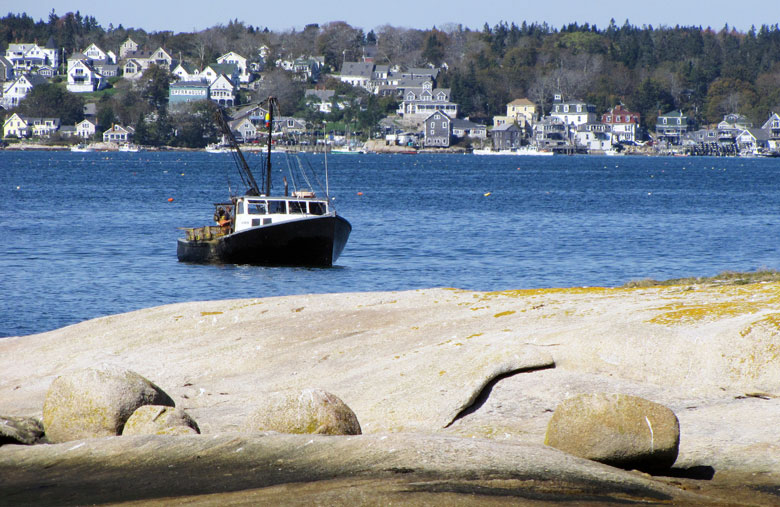Speaking at the state’s top lobster-landing port, Charlie Colgan had a harsh prognosis for the fishery. But he also offered hope for a future for the community in which it might still rely on a thriving blue economy.
Colgan, a former state economist and director of research for the Center for the Blue Economy at Middlebury Institute of International Studies, spoke at Stonington’s ongoing “Talk of the Towns” series on Oct. 9.
“Stonington is the lobster capital of Maine,” he said, but given the shift of the species over the last 20 years to the north and east, the industry is looking at just another ten to 20 more years. “Probably 20,” he predicted.
“It isn’t going to happened tomorrow, but it is going to happen,” Colgan said. “You’ve got time to shift.”
“How do we reinvent or invent new things to do with the ocean?”
Robin Alden, a former Marine Resources commissioner and co-founder of the Stonington-based Maine Center for Coastal Fisheries, responded to Colgan by noting that lobstering was a small-business economy, a desirable status.
Colgan was blunt, noting that while lobstering was advantageous, being large in scope and small with individual owners, “You will not succeed wholly as small sizes.”
An understanding of the blue economy could bring new opportunities, he said.
Asked by moderator Linda Nelson to define the term, Colgan said the blue economy could be understood in three components:
• The ocean economy: what comes from the ocean, including fishing, tourism, and recreation.
• Sustainability in extracting resources in the face of climate change.
• Technology arising from the ocean, including pharmaceuticals, aquaculture, and energy.
“Maine is pretty well-positioned in many ways,” Colgan said, but must ask itself, “How do we reinvent or invent new things to do with the ocean?” The three components he listed could be configured in different percentages for success, like a recipe, he said.
“It’s also about the land,” said Jim Damicis, senior vice president of Camoin Associates, also a speaker at the event. “What you do on the land highly matters,” he said, and cited his work with the city of Bath on its municipal interface with its waterfront.
Labor, utilities, and geology are among the elements that must be considered and understood during change. Damicis likened that change to what has come in the state’s forest economy, saying it’s “less about pulp and paper” now. “The tree is still there and has value,” and the same will be true for the ocean.
Carla Guenther, chief scientist at the Maine Center for Coastal Fisheries, asked about opportunities to retain traditional fisheries while welcoming new endeavors, which prompted Colgan’s grim prediction about the lobster fishery.
Processing lobster on a large scale, which was considered decades ago by the former State Planning Office, was one possibility, Colgan said. An investment in recycling lobster shells as a new product, and other, unanticipated innovations, might bring new wealth.
The lobster industry must shift away fossil fuel on its boats, given that among Maine fisheries, it produces the most greenhouse gases, Colgan said. Yet with climate change, fisheries now thriving in the mid-Atlantic region will emerge in the Gulf of Maine, an opportunity for harvesters here.
Colgan noted that the current regulatory system wasn’t well-matched to the rapid changes that are coming with climate change.
He also said the state should consider creating a public infrastructure insurance fund “for a rainy day” to cover working waterfronts damaged by storms. “We in Maine need to insure our own assets,” he asserted.
Another prediction was that “40% to 60% of captured fisheries will be replaced by cultured,” or aquaculture production in the U.S., though he confessed that it was more guess than data driven. “China is by far the largest aquaculture producer in the world,” he added.
Aquaculture should be done on an industrial scale, Colgan said.
“Oysters and mussels on a rope aren’t going to do it,” he said, because the market for those products are luxury and niche. Producing a seafood consumed daily in large numbers, like chicken, would be a better economic outcome, which is why Colgan favors the kind of onshore recirculating aquaculture plants that have been proposed in Jonesport, Bucksport, and Belfast in recent years.





